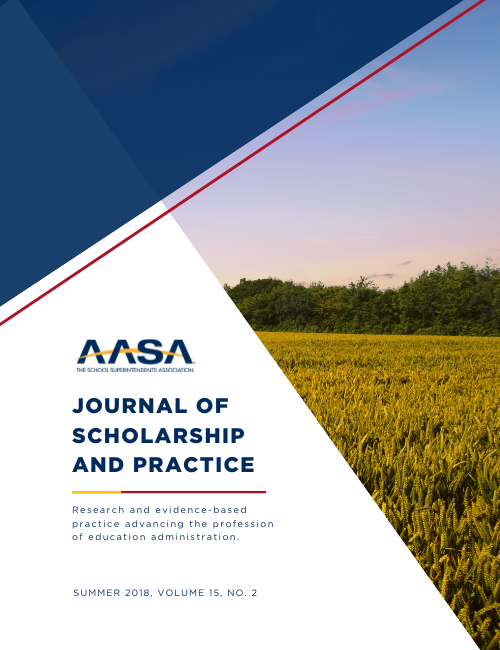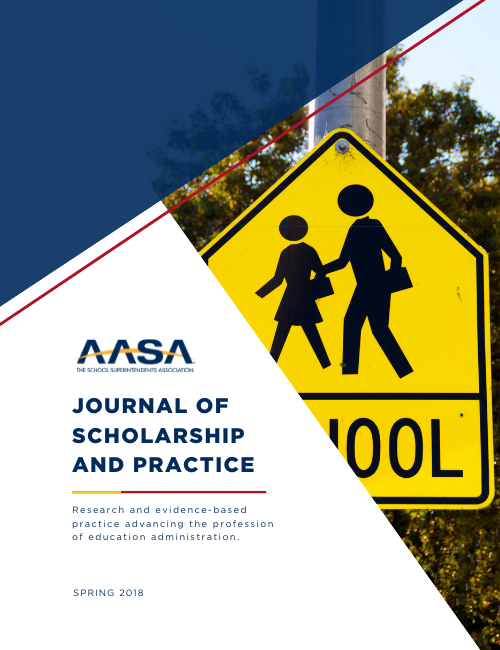2021 Fall Journal of Scholarship and Practice

The editorial written by Ken Mitchell, “The Superintendency In 2021: Leading Evidence to Address Inequities and Serve the Marginalized and At-risk in the Contested Spaces of America’s Public Schools,” sets the tone for the fall volume of the Journal. Mitchell lays out how recent efforts by some organizations such as Citizens for Renewing America and the DC-based Heritage Foundation as well as media outlets to oppose any school district or classroom study of CRT or related “divisive” topics reflect a response to an era of post-George Floyd politics in which the discussion of structural and systemic racism—its history and economic or social consequences—has been elevated. The backlash warns of a prevalent, albeit, presumed use of CRT in public schools.
Further, says Mitchell, the tactic to conflate an array of “divisive” topics under the mantle of CRT, although misleading, has been opportunistic and somewhat effective. It has shifted the argument from how we should amend structural and systemic racism to how we should protect our children from an indoctrinating liberal public-school agenda. Arcane language used to create fears about CRT’s pervasiveness has seeded distrust and dissent at the local public-school level.
With this back drop, the fall 2021 volume includes studies on a few of the “divisive” topics banned by Citizens for Renewing America and criticized by The Heritage Foundation and other organizations. The researchers offer evidence, interpretations, and recommendations for leaders who remain committed to leading schools and districts to address injustice and inequity as part of their mission.
In the first research article, based on results from The American Superintendent 2020 Decennial Study that reported survey results of 1,218 of America’s seated superintendents, writers Meredith Mountford and Jayson Richardson, who also contributed to the study, pull from the data on equity, community relations, and social media. They focus on how equity operates within and around issues of community relations and social media and further considers the extent to which these issues help or obfuscate promoting equity and the benefits and banes of superintendents attempting to do so. The second research article includes an examination of the inequity of teacher talent across school systems and is written by Henry Tran and David Buckman in their study titled, “A Descriptive Analysis of High Need Districts’ Inequitable Access to Talent-centered Education HR Systems.”
In keeping with themes addressing the needs of the at-risk and oft-marginalized group, Erin Sweeney and a team of researchers (Tavis Glassman, Joseph Dake, Susan Telljohann, Cynthia Beekley) examine the controversial issue of student drug testing as a preventative measure through the lenses of Colorado superintendents.
Christopher Tienken critiques a new book about an understudied topic, Canadian Indigenous Literature and Art: Decolonizing Education, Culture, and Society, by Carol Mullen. Mullen raises critical issues about Indigenous justice in Canada and brings forth rarely discussed perspectives found in education from the perspectives of Indigenous education and culture (literature and art).
Advertisement
Additional Articles
-
Promoting Equity in the Modern Superintendency
This article focuses on how equity operates within and around issues of community relations and social media
-
A Descriptive Analysis of High Need Districts’ Inequitable Access to Talent-centered education HR Systems
This study draws from the SHRM and TCEL literature to apply an HR systems typology to categorize school districts based on their personnel policies.
-
High School Drug Testing Perceptions Among Superintendents in Colorado
This study examines superintendents’ perceptions regarding drug testing of high school students.
Advertisement
Advertisement



